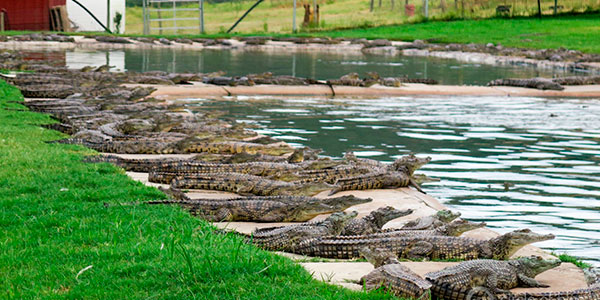Crocodile farming is a prime example of Speciality Agriculture and is not a new concept; it has been around for several decades, especially in regions with abundant natural habitats suitable for these reptiles.
Crocodile farming is a prime example of Speciality Agriculture and is not a new concept; it has been around for several decades, especially in regions with abundant natural habitats suitable for these reptiles. South Africa, with its favourable climate and rich biodiversity, has become a significant player in the global crocodile farming industry.
The industry primarily focuses on the production of high-quality skins, which are in great demand among luxury fashion houses worldwide.
In South Africa, there are two major buyers of crocodile skins. The first group comprises manufacturers who produce luxury goods such as handbags, shoes, belts, and other accessories. These manufacturers rely on the superior quality of South African crocodile skins to create high-end products that appeal to affluent consumers.
The second major buyer exports the skins to international markets, catering to renowned global brands like Louis Vuitton and Gucci. These brands value the exotic texture, durability, and aesthetic appeal of Nile crocodile skins, which are often used in their most exclusive and expensive product lines.
The crocodile skin market is highly specialized and niche. Less than 10% of the skins produced in South Africa are sold domestically. The majority of the wet skins, which have undergone initial processing but are not yet finished, are exported.
Approximately 90% of these exports are absorbed by fashion houses in Europe and Japan, known for their high standards and demand for quality materials. The lower-grade skins, which do not meet the stringent requirements of top-tier fashion brands, find a market in the Far East, where there is still a substantial demand for crocodile products, albeit at a lower price point.
The demand for Nile crocodile skin is driven by its unique characteristics. The skin is not only beautiful but also exceptionally durable and flexible, making it ideal for crafting luxury items. Fashion houses value these properties and are willing to pay a premium for high-quality skins. This demand ensures that crocodile farmers can achieve significant returns on their investment, provided they can meet the quality standards required by their buyers.
However, the crocodile farming industry is highly susceptible to changes in the global economy. Economic downturns can significantly impact consumer spending, particularly on luxury goods. When consumers tighten their belts, sales of high-end fashion items, which use exotic skins, often decline. This reduction in demand can lead to a surplus of crocodile skins, driving prices down and putting pressure on farmers. Conversely, during periods of economic prosperity, demand for luxury goods tends to increase, boosting the market for crocodile skins.
Crocodile farming itself is a complex and demanding enterprise. It requires substantial investment in infrastructure, including specialized breeding facilities, secure enclosures, and proper handling and processing equipment. Farmers must also ensure they comply with stringent animal welfare and environmental regulations, both to maintain the health and well-being of their crocodiles and to meet the standards of their buyers. The breeding and rearing process involves careful management to optimize growth rates and skin quality, including controlled feeding regimens and regular health checks.
Moreover, the processing of crocodile skins is a critical aspect of the industry. Skins must be meticulously prepared to meet the high standards required by luxury brands. This involves careful tanning and finishing processes that enhance the natural beauty and durability of the skins. Any flaws or imperfections can significantly reduce the value of a skin, so attention to detail is paramount.
Despite the challenges, the rewards of crocodile farming can be substantial. The high value of crocodile skins means that successful farmers can achieve significant returns on their investment. Furthermore, the industry provides important economic benefits to the regions where it operates, creating jobs and supporting local communities. In South Africa, crocodile farming also contributes to conservation efforts by providing a sustainable use for these reptiles, helping to protect their natural habitats and ensuring their long-term survival.
In conclusion, crocodile farming in South Africa is a niche but lucrative industry that plays a critical role in the global luxury fashion market. With two major buyers focusing on both local manufacturing and international export, the industry is well-positioned to meet the high demand for Nile crocodile skins. While susceptible to economic fluctuations, the market for these exotic skins remains strong, driven by the enduring appeal of luxury goods. For farmers who can navigate the complexities and challenges of the industry, crocodile farming offers significant rewards and contributes to the broader economic and conservation goals of the region.
The Company is an established and successful commercial Crocodile Farm based in South Africa. From the purchasing of the land and inception of the farm in 1997 to its present operational status, the current Shareholder has more than 18 years’ experience in the industry.
